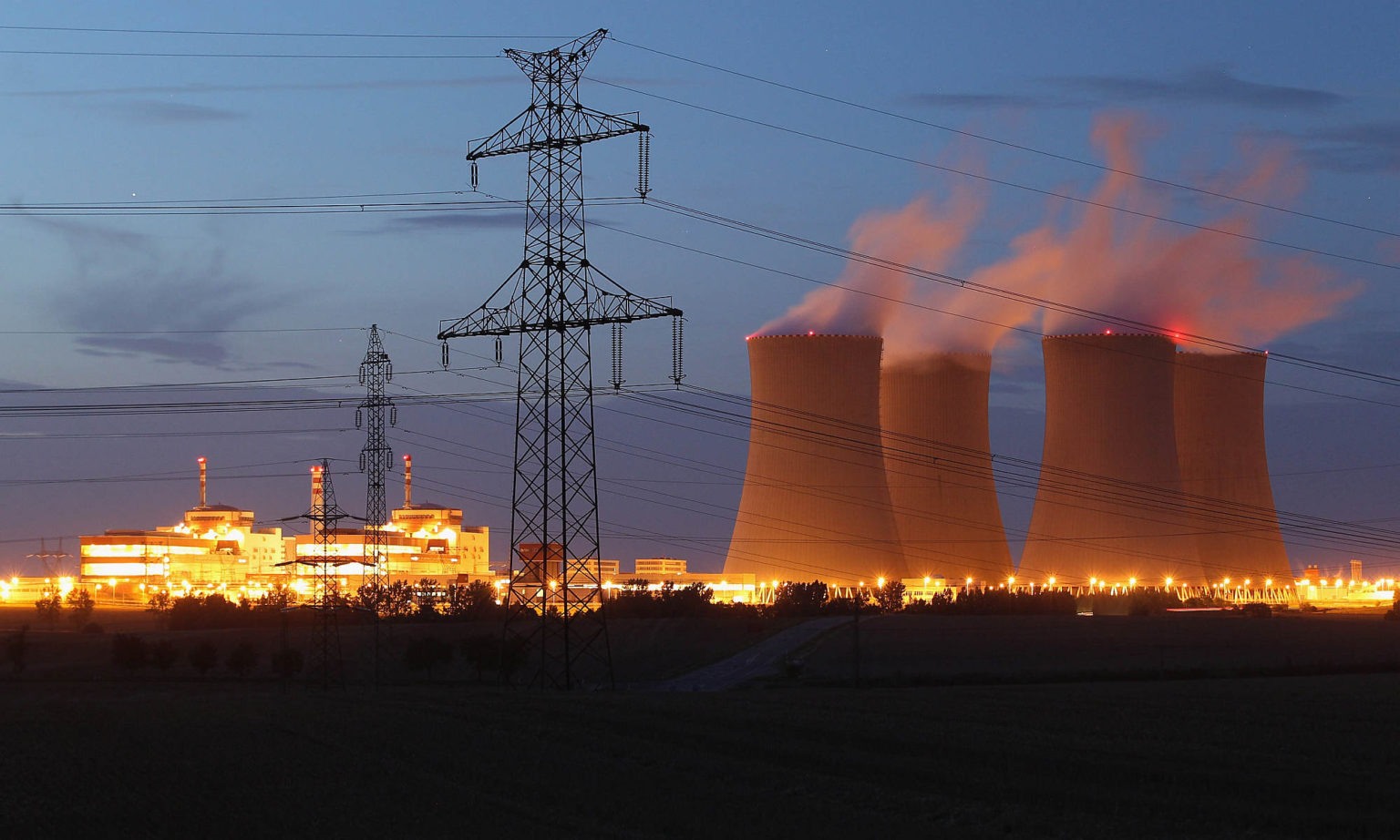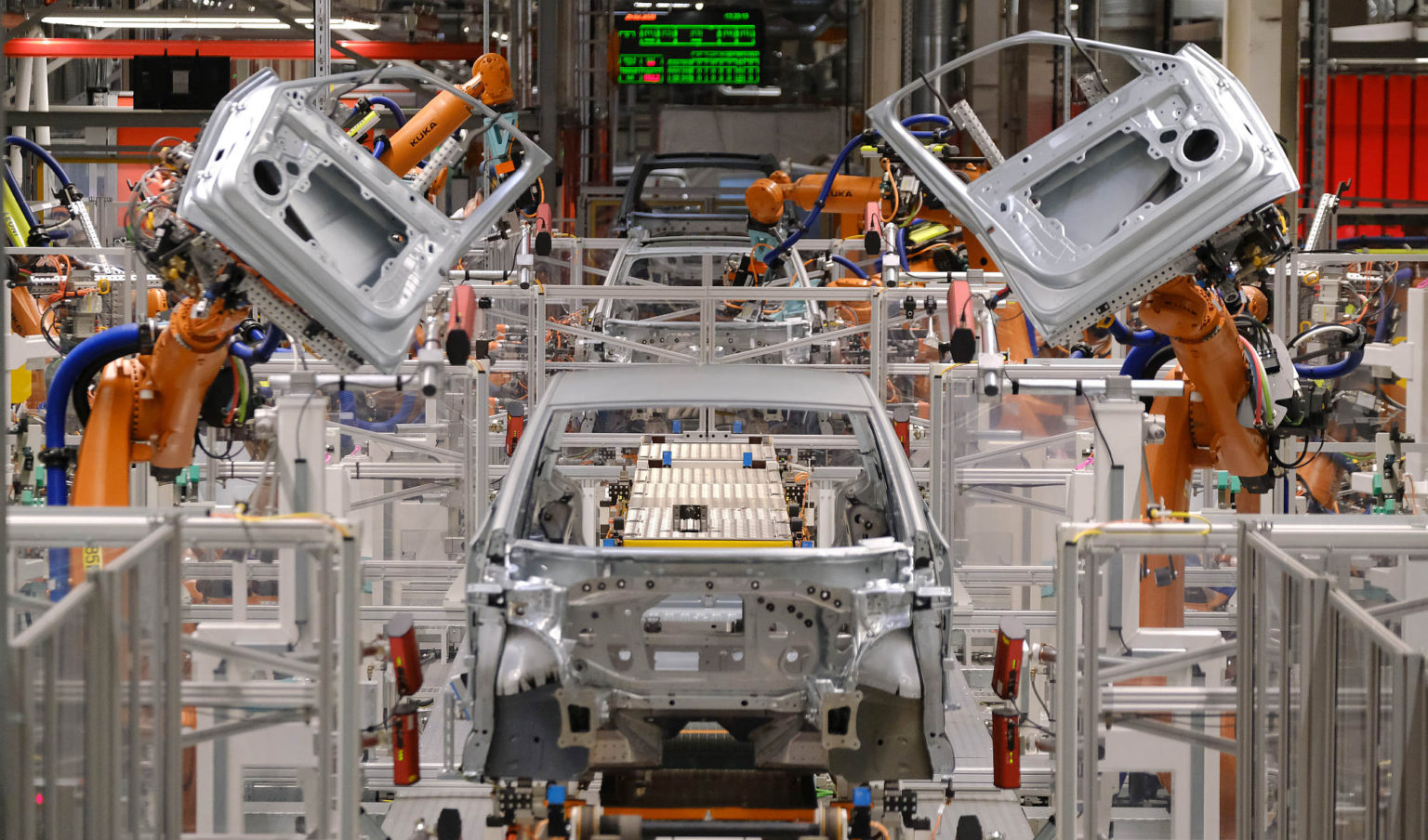
Long-read
The ‘reset’ we really need
Forget a ‘green industrial revolution’ – we need a massive boost to productivity.
The idea that the economy needs a ‘great reset’ in the wake of the Covid-19 crisis has gripped the elites across the Western world. Its basic premise is simple: policymakers should promote a recovery from the pandemic that helps to create a greener and cleaner world. In this scenario, as Boris Johnson argued in an article in the Financial Times, ‘green and growth go hand in hand’.
Although the terminology varies, the ideas are similar across the developed economies. Both the British prime minister and US president-elect Joe Biden talk of the need to ‘build back better’. The World Economic Forum – an international club for technocrats and the super rich – is promoting the term ‘great reset’. Prince Charles is probably its best-known advocate in Britain. The European Union talks of the ‘European Green Deal’, with the goal of making Europe ‘the first climate-neutral continent’.
On the face of it, as long as difficult questions are avoided, the premise seems eminently sensible. If the economy is going to recover, why not try to make it greener and cleaner? Surely a dirty recovery would be a bad idea? And job creation, a central part of many green recovery plans, also seems reasonable, too. This is particularly the case when unemployment looks certain to surge even further as job-retention schemes are cut back.
Before probing the idea of ‘reset’ further, it is important to make one thing clear. Mainstream advocates of a great reset are not supporters of degrowth. Where degrowth supporters explicitly call for a reduction in production and consumption, that is not the position of the likes of Biden or Johnson. On the contrary, in their own minds at least, mainstream politicians want to promote a more prosperous economy.
Of course, degrowth is a dangerous and growing trend which should be robustly challenged whenever it appears. It would inevitably take the world backwards in relation to poverty and immiseration. However bad such problems are right now – and they clearly remain widespread on a global scale – they would become far worse if we pursued degrowth.
Criticising advocates of a reset as if they were supporters of degrowth inevitably misses the point. The professed goal of resetting is somehow to marry prosperity with other imperatives, such as ensuring a clean environment and creating jobs. This is often expressed as the idea of sustainable growth or green growth. Or, as an article in a recent edition of the International Monetary Fund’s Finance & Development magazine put it, the claim is that ‘failing to invest in making our economies and societies more climate resilient undermines our future growth and wellbeing’. The key question, then, is whether these imperatives can really be combined in the way that is generally understood.
Boris’s 10-point plan
Boris Johnson’s 10-point plan for a green industrial revolution, announced in November, is a good place to start examining this question. It is in many ways typical of proposals for a reset.
For a start, it makes great play of its ambition. Indeed, the press release announcing the initiative starts by talking about the prime minister’s ‘ambitious 10-point plan’. It goes on to use the words ‘ambitions’ or ‘ambitious’ four more times in the space of a relatively short release.
But it does not take much probing to see that it is anything but ambitious. The plan says it will mobilise £12 billion of government investment by 2030. It also aims to spur over three times as much private-sector investment over the coming decade. But total managed expenditure – the total amount of money the government spends through departments, local authorities, other public bodies and on social security – is officially forecast to be £1,164.6 billion in this financial year alone. In other words, the amount of government spending for its proudly proclaimed ‘green industrial revolution’ – to be spread over a decade, it should be remembered – is just slightly over one per cent of what government spends in one year alone.
It should therefore be abundantly clear, even without much probing, that the government’s proposals are puny relative to the size of the economy. The effusive claims to ‘ambition’ are contradicted by the minuscule size of the plans.
But it would be wrong to draw the conclusion that what is needed is simply a lot more of the same. The problem runs much deeper than the scale of public spending proposed.
The prime minister’s 10-point plan is really a hotchpotch of different measures, many of which had already been announced before his November speech. They include, among other things, generating much more offshore wind power and advancing nuclear, making buildings more energy-efficient, and planting 30,000 trees every year.

Some of these proposals have a positive core, some have little relevance to promoting economic recovery, and others would likely be harmful.
On the positive side, the promotion of advanced nuclear power, explicitly advocated in the policy paper published alongside the 10-point plan, could be a boon. It is certainly a move that advocates of degrowth would staunchly oppose. The paper even goes so far as to argue that Britain should be ‘the first country in the world to commercialise fusion-energy technology’ – in other words, harnessing the huge amounts of energy that can be generated by combining atomic nuclei. This would be a massive benefit as it would mean virtually unlimited amounts of clean and cheap energy.
On the other hand, offshore wind makes little sense as a widespread energy source. The cost of constructing wind turbines and erecting them at sea – in both financial terms and energy terms – is enormous. Before even one watt of energy is generated, a huge amount of energy must be expended. Once they are erected the energy supplied will be intermittent – since it depends on the wind blowing – and once the turbines’ lives are over they have to be disposed of. This is also a task that demands a huge amount of energy. There might be a role for offshore wind in certain niche situations, but it does not provide a feasible solution to the world’s energy needs. As James Woudhuysen has argued previously on spiked, there is a huge amount of hype around renewable energy.
In relation to the job-creation schemes being promoted by Boris Johnson, most of them offer little if anything in the way of economic reinvigoration. Pushing unemployed workers to help insulate Britain’s existing housing stock is not going to bring the benefits so often claimed. A high proportion of Britain’s houses are old and leaky. Refitting them to improve their insulation is in many cases likely to involve a huge amount of effort for relatively little benefit. Building new and modern houses would be a different matter, but that is not what is on offer. Nor would involving many workers in the generally inefficient work of refitting old houses help to bolster productivity levels.
A similar case could be made against focusing on planting trees. There might be a case for job creation for social reasons, but, at least in the form being proposed, it will not help the economy.
Bolstering the number of people who work in care homes would probably be better from a social point of view. However, this would not tackle economic weakness, either. It is important that policies designed to help create jobs should be clear about the proposed benefits.
Of course, if job creation was aimed at dynamic and growing sectors or enterprises, that would be a different matter. That could be a genuine contribution to a more dynamic economy. But that is not the thrust of the government’s economic policy.
Indeed, the likelihood is that the much vaunted energy transition will bolster unemployment. Think of those who work in the fossil-fuel sector – a significant chunk of the economy – as well as those in aviation and tourism. Little is made of the likely impact on their jobs of a reset package. That is despite the fact that many of these sectors have suffered the most as a result of the lockdown restrictions associated with the Covid pandemic.
We need a productivity boost
This lack of a focus on productivity growth points to the key problem with packages such as Johnson’s 10-point plan. It is not simply their lack of ambition or their hotchpotch nature. It is that there is no concerted focus on making the economy more dynamic. Such a goal might be mentioned in passing but it is never the organising principle of contemporary economic policy.
This is a topic Phil Mullan has consistently addressed on spiked and in his book, Creative Destruction. For many years, the key weakness of the British economy – and indeed other Western economies – has been the failure to increase productivity at a reasonable rate. A dynamic economy needs to increase the average amount each worker produces in a given time, allowing it to better underpin the material wellbeing of its citizens.
To achieve such an objective requires genuine ambition rather than hype. It means providing backing for new sectors and technologies to help them get underway. It also means being prepared to remove backing from obsolescent or unproductive enterprises when they have passed their time. This is in sharp contrast to recent policy, which emphasises the provision of plentiful cheap credit in the form of ‘quantitative easing’. The effect of this approach is simply to shore up zombie companies rather than promote the emergence of new areas of economic activity.
It is also necessary to be willing to develop large-scale infrastructure where necessary. This means, among other things, aiming for plentiful cheap energy and encouraging physical mobility. It means building nuclear power stations, rapid transport networks and roads. It means taking inspiration from the rapid development of Covid-19 vaccines to promote rapid growth in other areas.
From this perspective, the British government’s plan for a green industrial revolution can be seen as an alternative to a recovery plan. It contains none of the drive and ambition necessary to promote the desperately needed revitalisation of the British economy. In practice it will mean a continuation of the British economy’s drift towards an ever more zombie-like state rather than an escape from it.
To the extent that there are potentially radical elements to Johnson’s plan – such as the attachment to nuclear power – these are likely to fall by the wayside or to be radically scaled down. Just consider the record of recent British governments on big infrastructure projects. Take, for example, the proposal to build a third runway at London’s Heathrow airport, first adopted by the Labour government in 2009. More than a decade later there is no sign of this project even starting. Indeed, it could well be a casualty of the ‘reset’, with the argument that air travel is no longer so desirable or necessary.
Or take the proposed High Speed 2 (HS2) rail network designed to improve the link between London, northern England and Scotland. It was back in 2010 that the government found there was a good case for HS2. Yet, more than 10 years later, the scheme is under review.
The point here is not the desirability or otherwise of particular schemes. There might, for example, be a better case for building a new London airport rather than extending Heathrow. It is rather that more ambitious projects tend to fall by the wayside when it comes to implementing proposals.
It is relatively easy to create schemes for the unemployed to plant trees or add insulation to old houses. In contrast, projects that could be transformative may be announced to great fanfare but they all too often disappear into a bureaucratic morass.
A key part of the problem with the ‘great reset’, then, is the culture of caution that has enveloped both government and the business class. They may desire prosperity in the abstract but they lack the drive necessary to see it through in practice.
Green austerity
The situation is worsened by what I have called growth scepticism. This is the idea that economic growth has to be limited for the sake of the planet and other imperatives. This outlook is not anti-growth in an open way. Rather, it says there should be growth but it should take a limited form. In that sense it is part of the culture of caution rather than a separate trend.
‘Green growth’ is not a synonym for promoting a clean environment. It is about being extremely cautious about economic progress on the grounds that it can do serious damage to the natural world. This helps to explain why wind and solar energy trends are always to be welcomed, because they are seen as ‘natural’. Whereas nuclear power is often shunned.

From the government’s point of view, it is of course much easier to go along with the green agenda than to try to resist it. It has widespread support among the middle classes and a network of activists intent on implementing eco measures. In contrast, large-scale infrastructure projects are guaranteed to meet determined resistance from the same layer of people.
This explains why the British government passed a law in 2019 committing Britain to a ‘net zero’ target in relation to greenhouse-gas emissions by 2050. This no doubt helped to give the government a sense of purpose last year, and it appealed in particular to many middle-class voters.
But as time goes on – well ahead of the 2050 deadline – the ‘net zero’ target will make it harder for Britain to meet its energy needs. Energy generation based on fossil fuels will be phased out while any nuclear plans will face stiff resistance. Yet renewable energy, such as wind and solar, is limited because of its intermittent character.
The more recent announcement of a ban on the sale of new petrol and diesel cars by 2030, part of the government’s green plan, will also have a negative effect. This will hit the poorer sections of the population hardest – they are often dependent on relatively cheap conventional cars.
No doubt green activists will claim such measures are necessary as the world is facing a ‘climate emergency’. Indeed, Britain’s parliament endorsed this concept back in May 2019. Although the motion was raised by the Labour opposition, then under the leadership of Jeremy Corbyn, it was passed without any division.
The problem is that, to the extent that climate change presents a problem, the mainstream measures promoted to tackle it will only make matters worse. This is because a richer, more productive economy would be better able to afford the often expensive measures necessary to tackle climate change. In contrast, a stagnant economy would be more stretched in that respect.
The official focus on the ‘mitigation’ of climate change in effect makes rationing the main plank of policy. Indeed, some of the likely consequences were spelt out in the recent Carbon Budget produced by the Committee on Climate Change, a body set up to advise the British government on such matters. Among the measures proposed were increasing energy bills (although the report says it hopes these rises will not be too large); a shift in diets away from dairy and red meat; and putting limits on air travel. This is simply austerity by another name.
In contrast, a genuine approach to tackle climate change demands a more productive society rather than one where the public consumes less. It means, for example, giving more weight to nuclear energy as it does not generate greenhouse gases.
The infrastructure needed to help adapt to climate change also costs money. Building better flood defences, for example, can be costly. This means that building a more productive economy, as well as benefiting humanity directly, is necessary for any rational strategy to tackle climate change.
A different sort of reset
There is only one respect in which the supporters of a ‘great reset’ are right. A restructuring of the economy is indeed necessary. But it should certainly not be a reset that is green in form.
On the contrary, it needs to be a reset based on genuine ambition. Its goal should be to facilitate the creation of a more productive economy. This means the authorities stepping back from supporting decrepit industries and moving forward to produce new ones. It means being open to large-scale infrastructure projects, including those that involve large-scale energy production.
The resultant rise in economic output would benefit humanity enormously. It would also help generate the resources necessary to help tackle the problems associated with climate change.
Such a reset will not come from the World Economic Forum, the European Union or Britain’s decrepit rulers. The initiative will need to come from those who are on the side of economic progress against the stifling influence of the green orthodoxy.
Daniel Ben-Ami is a writer based in London.
All photos by: Getty Images.
To enquire about republishing spiked’s content, a right to reply or to request a correction, please contact the managing editor, Viv Regan.







Comments
Want to join the conversation?
Only spiked supporters and patrons, who donate regularly to us, can comment on our articles.